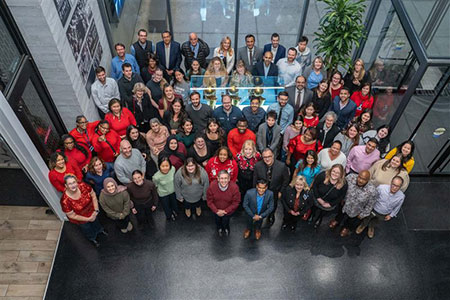Therapeutic Medical Physics Residency Program
Department Chairman: Benjamin Movsas, M.D.
Residency Program Director: Akila Kumarasiri, Ph.D.
Residency Program Co-Director: Brian Bismack, M.S., Jessie Huang-Vredevoogd, Ph.D.
Residency Coordinator: Lakeisha Kemble
The 2-year CAMPEP-accredited Therapeutic Medical Physics Residency program at Henry Ford Hospital prepares graduates for a successful career in medical physics and radiation oncology. The goal of the program is to provide practical clinical medical physics experience in a mentored setting, supported by comprehensive didactic learning experiences.

Primary objectives of the program
- Residents acquire the broad knowledge base, analytical skills, and clinical experience necessary to fulfill the traditional roles of quality assurance, treatment planning, and radiation safety.
- Residents develop sufficient abilities to flourish in an evolving and expanding field by adopting new technologies, investigating novel treatment techniques, and critically evaluating QA processes and clinical workflows.
- Residents refine communication and professionalism skills to contribute collaboratively in a modern multi-disciplinary workplace.
- Program graduates are prepared for certification in the specialty of Radiation Oncology Physics by an appropriate certification board.
What makes Henry Ford’s medical physics residency unique?
State-of-the-art Facilities: Residents are based at the Brigitte Harris Cancer Pavilion (BHCP), Henry Ford’s flagship cancer center. Additionally, residents rotate among the health system’s five satellites, located throughout the greater metro Detroit area. This provides the opportunity to experience both a large academic hospital-based practice, and various community-based settings.
Cutting-edge Technology: The Henry Ford system is home to:
- First Siemens Healthineers MAGNETOM Free.Max RT Edition in the world
- First ViewRay MRIdian MR-guided linear accelerator to treat patients in the world
- First Varian Edge Sterotactic linaear accelerator in North America
- First Varian Halcyon system in Michigan
System-wide, Henry Ford is home to:
- 2 ViewRay MRIdian MR-guided linear accelerators
- 6 Varian TrueBeam linear accelerators
- 1 Varian Edge linear accelerator
- 4 Ethos linear accelerators
- 7 Philips Brilliance Big Bore CT scanners
- 1 Siemens Healthineers MAGNETOM Free.Max RT Edition MR Scanner
- 2 Varian Bravos HDR afterloaders
- Fully integrated Eclipse TPS and Aria R&V system
Apprenticeship Training Model: Residents work alongside a staff of over 20 board certified medical physicists. During each rotation, they develop clinical skills by working side-by-side with expert staff members. At the culmination of each rotation, the resident is capable of independently and proficiently performing relevant clinical skills.
Guided Didactic Instruction: Each week residents complete a didactic reading assignment related to their current clinical rotation. Residents discuss the material in a one-on-one setting with an expert staff member.
Peer-to-peer Learning: Henry Ford supports 4-5 residents (2-3 positions per year). On a weekly basis, residents meet as a group with program directors to present their current work to one another.
Leadership in an Evolving Field: Residents are provided opportunities to participate in or lead clinical research projects and the implementation of new technologies. Due to the breadth of the health system, residents can reasonably expect to be involved in at least one major clinical commissioning effort during their two-year residency. While research is not required, ample opportunities and support exist for the motivated resident to pursue clinical research interests.
Summary of rotation descriptions
| # | Rotation Title | Duration |
|---|---|---|
| 1 | Introduction to Radiation Oncology and Machine QA | 13 weeks |
| 2 | Treatment Planning | 13 weeks |
| 3 | Radiosurgery (SRS/SBRT) | 13 weeks |
| 4 | Brachytherapy | 13 weeks |
| 5 | Advanced Treatment Planning and Treatment Planning Systems | 13 weeks |
| 6 | IGRT and Imaging for Radiotherapy | 9 weeks |
| 7 | Radiobiology | 4 weeks |
| 8 | Annual QA and Advanced QA | 9 weeks |
| 9 | Special Procedures (TBI, TSET, Intraoperative Radiation) | 4 weeks |
| 10 | Radiation Safety | 4 weeks |
.svg?iar=0&hash=F6049510E33E4E6D8196C26CCC0A64A4)
/hfh-logo-main--white.svg?iar=0&hash=ED491CBFADFB7670FAE94559C98D7798)